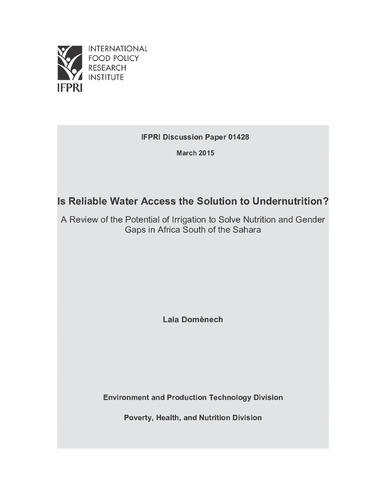Is reliable water access the solution to undernutrition? A review of the potential of irrigation to solve nutrition and gender gaps in Africa South of the Sahara
Abstract
Interventions aimed at increasing water availability for livelihood and domestic activities have great potential to improve various determinants of undernutrition, such as the quantity and diversity of foods consumed within the household, income generation, and women’s empowerment. However, current evidence on the topic is diluted across many different publications. This paper aims to connect the dots and review the literature available on the linkages between irrigation and food security, improved nutrition, and health. We conclude that the evidence remains insufficient to draw broad conclusions due to the low number of rigorous studies that can be used to assess the linkages. Based on the limited evidence, six factors that should be taken into account in irrigation development to address nutrition and gender gaps with a focus on Africa south of the Sahara are identified: (1) food security and nutrition gains should be stated goals of irrigation programs; (2) training programs and awareness campaigns should accompany irrigation interventions to promote nutrient-dense food production and consumption as well as minimization of health risks; (3) multiple uses of irrigation water should be recognized in order to improve access to water supply and sanitation and livestock and aquatic production; (4) women’s empowerment and women’s participation in irrigation programs should be promoted; (5) homestead food production should be encouraged; and (6) policy synergies between different sectors (agriculture, nutrition, health, water supply and sanitation, education) should be sought.

